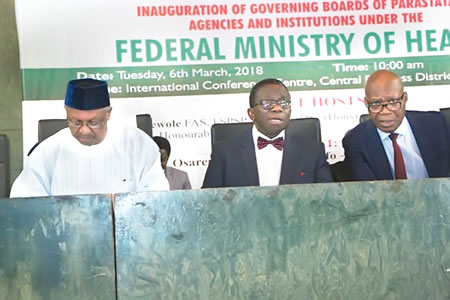He made the appeal at the opening of a two-day training workshop for healthcare providers on standards and guidelines for the medical management of victims of violence developed by Federal Ministry of Health with support from a global non-profit organisation, IPAS, which was held at Ibadan, Oyo State.
Adewole, who was represented by the Director, Gender, Adolescent, School Health and Elderly, Federal Ministry of Health, Dr Christopher Ugboko, stated that the three states that have domesticated the act are Anambra, Ebonyi and Oyo states.
He explained that at the federal level, the VAPP Bill was passed by the National Assembly in 2015 and was subsequently assented by former President Goodluck Jonathan on May 25, 2015, saying “the passage by the National Assembly and endorsement by the President signalled an end to the hopelessness that characterised the prosecution of cases of violence against persons, particularly women and girls. It was a climax to 14 years of legislative advocacy by women’s groups and gender activists.
His words: “For states that have not domesticated it, the process is on. We are doing advocacy. What we are doing here today in Oyo State is also part of the advocacy. We believe the bill will go beyond the boundaries of Oyo State, to tell other states that it is time that they adopt the VAPP Bill because of the advantages that we are all going to reap from the adoption.”
The advantages, according to him, would make it obvious to the victims of violence that they should “no longer keep QUIET. People lose their lives to violence. Those that are still alive should begin to take steps to get justice.
“The VAAP Act, as it is called, meant that all laws dealing with violence under the criminal and penal codes have been superceded and are to be determined by a new set of guidelines. It provided voice for the one in every three voiceless Nigerian women aged 15 to 49 years, who have suffered violence in their lifetime.”
“But this being a federal law could only be operated within the Federal Capital Territory and required to be adopted by state legislatures to have effect in those domains. It is in this regard that I salute the authorities in Oyo State for being exemplary and displaying of the core issues with regard to violence.”
Oyo State Commissioner of Health, Dr. Azeez Adeduntan, represented by the Executive Secretary, Oyo State Primary Healthcare Board, Dr. Lanre Abass, noted that the Oyo State House of Assembly passed VAPP Law in 2016, saying although, penalties for different forms of violence were well specified in the VAPP Law, “but the economic consequences should be considered while the health consequences need to be properly managed.”
The VAAP Act addresses several forms of violence that include abuse, accessory, accessory before the fact, battering, circumcision or genital mutilation, damage to property, use of dangerous weapons directed to a person, discrimination, exploitation, economic abuse, harassment and harmful traditional practices, as well as emotional, verbal and psychological abuse.
The Country Director of IPAS, Hajia Hawa Ibrahim, represented by the Programme Advisor, Bibian Amah, urged the healthcare providers and other stakeholders to ensure that the training “gets to the grassroots,” promising that the organisation would continue to do its best in supporting the gesture to eliminate violence against persons in the country.






